|
Getting your Trinity Audio player ready...
|
Reading Time 8 mins
2017/01/28
Preparing UWI for the Challenges of the 21st Century: An Interview with Vice Chancellor Sir Alister McIntyre [**Reprint**]
“If we don’t know from where we comin’ / Then we cyah plan where we goin”.
– Black Stalin, Caribbean Unity (1979)
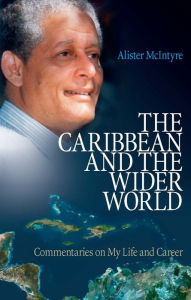
The Caribbean and the Wider World: Commentaries on My Life and Career
Born in St. Georges, Grenada, Sir Meredith Alister McIntyre is considered one of the Caribbean’s eminent thought shapers and academicians. This highly celebrated Caribbean integrationist and internationalist has served the Caribbean in various capacities, representing the region in many international forums.
The December 12, 2016, launch of Sir McIntyre’s book, The Caribbean And The Wider World: Commentaries on My Life and Career, has come with great anticipation because of the reservoir of experience it shares. Today is also a moment when the region needs self-reflection. The book chronicles the wide range of Mr. McIntyre’s celebrated career in academia, regionalism, and multilateral cooperation. Sir McIntyre assumed the role of Vice Chancellor of the University of the West Indies (Mona, Jamaica) in 1988, serving in this capacity for ten years.
As a precursor to a review of this timely book, Big Drum Nation publishes the final segment of the interview between Sir McIntyre and Winthrop Holder of the N.Y. Daily Challenge during Sir McIntyre’s stint as VC of the University of the West Indies. This final segment, even more relevant today, was published in the Daily Challenge on August 14, 1995. – BDN
The Interview
‘Not sun, sand, and calypso.’
In this, the final segment of a three-part interview, Sir Alister McIntyre, Vice Chancellor of the University of the West Indies, outlines the 21st-century vision for the university, which includes cementing ties with the United Negro College Fund and increased collaboration with other universities. In addition to highlighting the success of the university’s Distance Learning Facility, which reaches satellite campuses in 14 English-speaking Caribbean nations, Sir Alister also comments on the changing landscape of Caribbean society and calls for a new contract between citizens and their communities. Winthrop R. Holder interviewed the [NY] Daily Challenge.
Holder: To facilitate the cross-fertilization of ideas and the infusion of new approaches, to what extent does the university employ people who are non-UWI graduates and encourage student and faculty exchanges with foreign institutions?
McIntyre: About 80% of the university is West Indian. And more than half of that 80% did their graduate work outside because our graduate programs are relatively small. But as a matter of policy, we want to send people for graduate work outside for at least part of their graduate work—it might be the post-work component. We are developing split PHDs whereby a graduate student can do some of his post-work at UWI and go somewhere else to complete their post work and the foreign institution co-supervises the work. We have quite several exchange arrangements in place already. We have a very good one in Canada with the University of Toronto. Here in the States, we had one with John Hopkins University in History; now, it’s a bit dormant. But it very much depends on the individual department. So we want to systematize this and negotiate cooperating arrangements that will more or less apply across the board.
Holder: Have any relations been developed with historically Black Colleges?
McIntyre: We are developing arrangements with the United Negro College Fund–the historically Black Colleges. And we are working with a number of them, particularly with Selma College, where we have student and faculty exchanges in women’s studies. We are also working with Medgar Evers College and Texas A&M. We’ve always done work with Howard University.
Holder: In what other areas of study has this been done?
McIntyre: We have done it in engineering, social sciences, and even education. I think that’s the way to go. We are joining a lot of networks.
Holder: Can you explain the University’s Distance learning Facility and its success or failure to date?
McIntyre: The Distance Learning facility essentially involves the transmission of teaching programs and a certain amount of professional activity via satellite. This is still one of the most successful programs in the university. On the teaching side, we are now teaching first-year and mid-level programs like certificates and diplomas—a wide variety of fields. The registration for these is very substantial. We are thinking now—once we have laid the technology—we will bring it to video teleconferencing. We hope to take it to the second year within the next 10 – 18 months. And we might eventually put an entire degree program on the system.
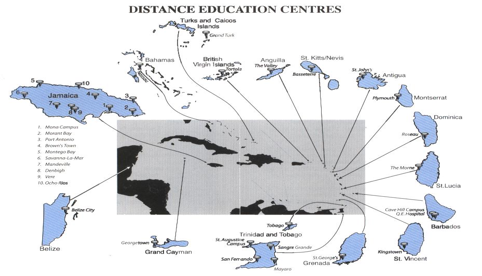
Holder: Are there any drawbacks to distance learning?
McIntyre: What happens, of course, is that students do the first year on the University of the West Indies Distance Teaching Enterprise (UWIDITE) facility, and they come on campus for the other years. And we have watched the performance of those students who started on distance in various fields […] Of course, many distance students are more mature, so we have to bear that in mind…
Holder: Has the application of the new technology led to connections with other universities? And how will this impact enrollment and cost?
McIntyre: We are studying the feasibility of operating a 24-hour educational channel with three other universities n Latin America. We can’t use up 20 hours of online time. But if everybody takes the equivalent of six hours, we could use educational television throughout the region and beam it into Latin America.
The new technologies offer us enormous opportunities for increasing access to higher education and, of course, cutting the cost of higher education, which is very substantial. The cost of a UWI place is 50 times that of a place in a primary school. So one has to realize what we are dealing with. It’s a very expensive form of education. It gets more expensive because higher education is globalized and academic staff is very mobile.
Holder: What percentage of the cost of education do students pay?
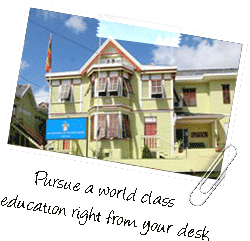
Marry show House, UWI’s Open Campus in Grenada, provides public service, outreach activities, research, and continuing education programming
McIntyre: They pay 16%. What we are doing is backing that up with a student loan program. And certainly in Jamaica—I am not sure what happens elsewhere—students can borrow on their own surety [but] a student from the lower income sector doesn’t have that choice. And if they opt to go into a career of higher social priority, the government will rebate the payments of their loans for the years of service. For example, if they go into teaching, the government picks up their annual repayment every year in that profession.
Holder: What allowances are made for students who have the academic ability but may lack the financial resources?
McIntyre: The process works like this: In all countries, we advertise places-for law or whatever. Then we send a list of those students who have been accepted to individual governments, which would take up 85% of tuition. Then we arrange for them to go to banks and negotiate a loan for the [remaining] 15%. Students must find the money for clothes, food, books, etc. We are trying to do two things: First, we are trying to get companies to give bursaries and link it to vacation employment… And, secondly, we are trying to do something that we haven’t done much of; campus employment—[although] the students themselves are very hesitant… In Jamaica, about 40% of our students are from households below the poverty line… We have been doing a lot of detailed studies of that. So we need to address this more substantially.
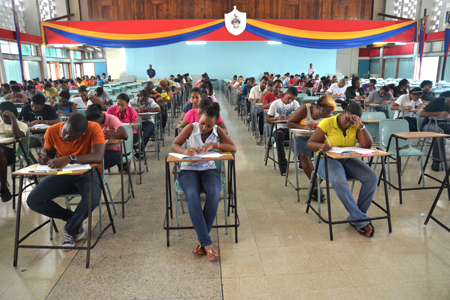
Student Assessment
Holder: What benefits are there to American students studying in the Caribbean?
McIntyre: I think they would be exposed to a much more different cultural setting than they would experience in the United States. We have tended in the past—although we are moving away from that—to follow the British system. This means that in every course, you do a certain amount of lectures and tutorials… That is a very labor-intensive way of teaching. So we might have to back away from it. We are doing that already. We don’t use the multiple-choice system as heavily as American universities do. We have to mark a lot of scripts. On the other hand, it gives students much better exposure to writing.
Holder: I hope your response spelling out the rigorous requirements doesn’t deter American students from considering UWI…
McIntyre: Well, I don’t want to portray a sun, sand, and calypso image and stuff like that. That’s there, of course. But we are a serious institution. So if you are a serious student, you are expected to work as everybody has to. It’s a suitable melting pot type of people, and it would be a new experience for foreign students.
Holder: What is the cost of tuition and board?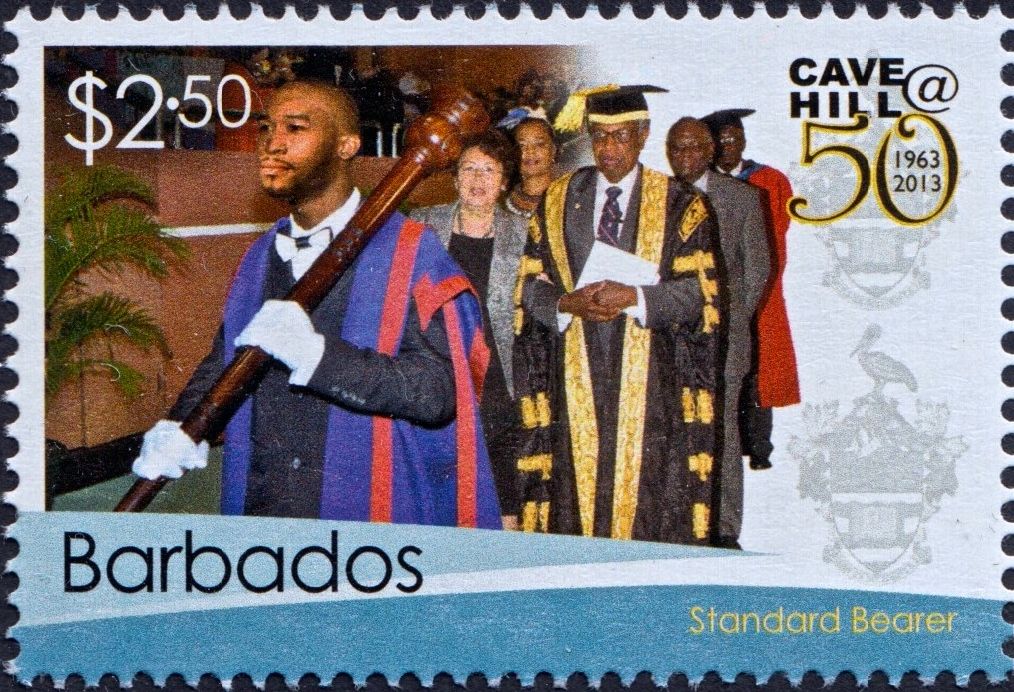
McIntyre: In the liberal arts, I would assume about $1,000 a semester.
Holder: What were the major recommendations of the West Indian Commission concerning education?
McIntyre: I’ll tell you the one that satisfied me. I am very satisfied with the Commission’s work. But the one that satisfied me was at the last Heads of Government Conference; they agreed that from January 1, 1996, all graduates would enjoy the freedom of movement in the Caribbean. That’s a big plus for us.
Holder: Have governments become more tolerant of radical/activist faculty? Remember the expulsion of the late Walter Rodney from Jamaica…
McIntyre: In the 1970s, we had a lot of problems. Today, there isn’t as much active political activity. When I left the university in 1972, during lunchtime, there were political groups everywhere. When I came back—and I’m not happy with this situation—and I saw all these lunchtime groups, I asked: “What parties are these? Political parties?” They were religious groups. The evangelists have taken over, particularly among women. I am worried about this because one of them tends to discourage [female] students from continuing their studies. That worries me a lot.
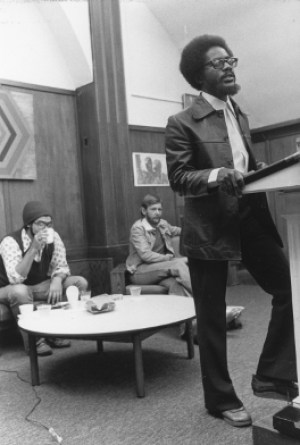
University of the West Indies (UWI) lecturer and historian Dr. Walter Rodney
Holder: What accounts for the seeming depoliticization of students and the populace?
McIntyre: The whole environment has changed. First of all, there is widespread misbelief and mistrust in the government. The governments are really on the downside. Secondly, I don’t particularly care for this either—students, like the rest of society, are extremely materialistic. Their focus is on their job, car, house, and clothes…. Spare a thought for the community where you live!
I was telling some colleagues the other day who were talking about finding rich husbands: “Look for poor husbands who are rich in values; not rich husbands who are poor in values” Thai is the problem we face.
Holder: Any special message for the Caribbean community?
McIntyre: We are very much counting upon the Caribbean community in the U.S. to help us through this transition period.
Holder: In what concrete ways can the community help?
McIntyre: You are accumulating a lot of experience about what is happening in the United States, how the U.S. is changing. And you must have your own thoughts on how an area like the Caribbean must respond to changes. That is one thing. Secondly, take an interest in the university and its activities. Encourage your children and relatives to come down and take a few summer courses. And wherever you find it possible, send some financial support. It’s your university, after all.
| CHANCELLORS | |
| HRH Princess Alice | 1950-71 |
| Sir Hugh Wooden | 1971-74 |
| Sir Allen Lewis | 1974-89 |
| Sir Shridath Ramphal | 1989-03 |
| Sir George Alleyne | 2003-16 |
| VICE-CHANCELLORS | |
| Sir Arthur Lewis | 1960-63 |
| Sir Philip Sherlock | 1963-69 |
| Sir Roy Marshall | 1969-74 |
| Ashton Preston | 1974-86 |
| Sir Alister McIntyre | 1988-98 |
| Hon Rex Nettleford | 1998-04 |
| E. Nigel Harris | 2004-15 |
| Sir Hilary Beckles | 2015-Present |
_ _ _ _ _ _ _ _ _ _ _ _
Winthrop R. Holder, a New York City educator, has written extensively on Caribbean cultural pedagogy. He is the author of Classroom Calypso: Giving Voice to the Voiceless (Peter Lang International Academic Publishers, 2007)

